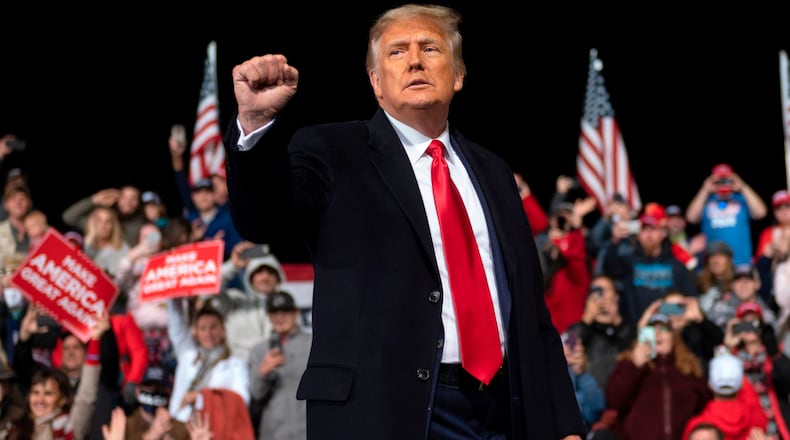Donald Trump has never been an understated man. His motto in life always seems to have been, “Why just do something when you can overdo it?” So it’s fitting that just as Trump has launched his third run for president, he is also now poised to become the first former president to be indicted at least once, and possibly twice.
The first set of charges could come from Alvin Bragg, the District Attorney in Manhattan, who took over the years-long investigation into a $130,000 payment from Trump’s then-lawyer, Michael Cohen, to an alleged former mistress, Stormy Daniels. It was a hush-money scheme, Cohen has since said, designed to keep Daniels quiet ahead of Trump’s 2016 run for president. The technical offense, according to New York law — bookkeeping fraud.
Although doctoring business documents is a serious offense, it hardly seems to be the kind of violation that would cause a former president to be led away in handcuffs. Bragg is reportedly considering adding a federal campaign finance violation to the bookkeeping piece, which would bump the potential charge from a misdemeanor to a felony.
Unless Bragg has more in reserve, it seems likely that a New York prosecution of Trump will only play into his campaign storyline of conspiracies, grievances, and gripes against the “Deep State.”
The applause line for the Trump 2024 rally practically writes itself. “Can you believe it?? Bookkeeping fraud!! It’s the most disgusting witch hunt in the history of our country!!”
But the Fulton County case is another matter entirely. Unlike the hush money allegations, which involved Trump, his staff, and his alleged mistress before he was elected, the Fulton County case goes to the heart of what it means to be a candidate — and what it means to have a democracy.
Election laws have been established to protect candidates, voters, and the integrity of the democratic process. Are all candidates following the law? Are they accepting results or challenging them through the proper legal channels? Or are they defrauding the citizens who cast their votes legally and deserve to have them counted legally, too?
The details that have come out of the special Fulton County grand jury investigation and the AJC’s own reporting since the 2020 election have raised serious questions about Trump’s conduct, as well as the role of several associates after he lost the 2020 election in Georgia.
Most famously, of course, was Trump’s recorded phone call to Georgia Secretary of State Brad Raffensperger nearly two months after the election when he demanded, “Fellas, I need 11,000 votes. Give me a break. You know, we have that in spades already.”
Eventually, Raffensprger told Trump, “Well, Mr. President, the challenge that you have is the data you have is wrong.”
We know now from testimony before the House Select January 6th Committee, that Trump had already been told his facts were wrong — and that he had lost the election in Georgia — by his own Attorney General, the U.S. Attorney he appointed in the Northern District of Georgia, his White House counsel’s office, and campaign lawyers.
Former Attorney General Bill Barr told the committee that when Trump and Rudy Giuliani floated their theories of a “rigged” election to him immediately after Election Day, he told the then-president the allegations were “(expletive).”
Barr called Trump’s evolving conspiracies “bogus,” “stupid,” and “crazy stuff,” and said responding to them was “like a game of Whack-a-Mole.”
But that game of Whack-a-Mole had broader consequences here. Because the president continued to claim he’d won, despite being told repeatedly that he had not, the state of Georgia conducted a statewide machine recount, a statewide hand recount, and a signature audit in Cobb County.
Both the state House and the state Senate convened special hearings to give a platform to Trump’s conspiracies, which were then broadcast live to Trump supporters watching from home. And because of that bogus testimony, Georgia campaign workers, including Ruby Freeman and Shaye Moss, proceeded to have their lives threatened and their privacy destroyed.
Willis has said she’ll bring an indictment in the Trump case, “If I can prove fact A, fact B, and fact C.” And she’s proven time and again that she’s prepared to go after targets even when it’s not universally popular. There was probably more peril to Willis in sending Atlanta teachers to prison for racketeering, which she did in 2015, than there would be for indicting Trump in Fulton County, as long as the case is strong and the trial is fair.
But the larger question, for Bragg, for Willis, and for the country, is whether the spectacle of charging a former president with a crime and then bringing that case to trial will strengthen the country or weaken it.
For Bragg, you have to wonder if the potential crime really rises to the level of all the trauma the country could suffer through — the demonstrations, the potential Jan. 6th replays, the media circus Trump will enjoy during the 2024 campaign, while his GOP rivals mostly get a media blackout.
But for Willis, the potential crimes Trump may have committed were different, as were their spiraling consequences.
When former President Gerald Ford issued a pardon to Richard Nixon following the Watergate scandal, Ford said his primary motivation was to spare the country the spectacle of a trial against a former president, even if that president had committed crimes against the country.
But he added that Nixon had paid “the ultimate price” when he resigned from office in disgrace. Unlike Nixon, Trump is barreling ahead for a third presidential run.
Again, why just do something when you can overdo it, even if it means breaking the law? Especially if you know you can get away with it.
About the Author
Keep Reading
The Latest
Featured




